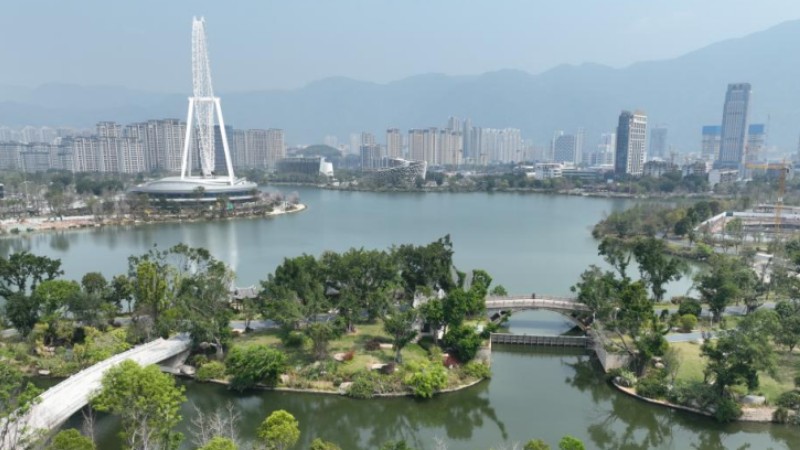Fruits of the Chinese whole-process people's democracy
China is an ancient civilization and has experienced many ups and downs in history. China was a great power and prosperous nation in history, but the country also experienced deep lows, especially after the Opium War in 1840, China was the victim of colonization and often faced coercion from the Western world. Being a great nation, China never missed any opportunity to learn and improve, even from its sufferings.
It has become more united, more mature, and even wise and smart. Under the leadership of the Communist Party of China (CPC), the People’s Republic of China was founded in 1949 and since then has undergone serious political reforms.
Today’s China is a strong country and the second-largest global economy. The progress and developments achieved in China are reflected in all spheres of life including lifestyle, material, and spiritual aspects. The CPC has been instrumental in bringing reforms and developments in all sectors including politics, agriculture, industry, and defense.
On the political front, the whole-process people's democracy is a relatively new expression, to describe the kind of democracy that's been developed and which works in China.
Having lived in China for decades as a sinologist, what I have seen, experienced and witnessed is that the whole-process people's democracy is described as a people- and results-oriented approach for ensuring national rejuvenation and common prosperity. It is a Chinese dream and the whole nation is working hard to achieve it. Under the visionary leadership of the CPC, China will realize its dream in the very near future.
The whole-process people's democracy combines both direct and indirect elections with complementary forms of systemic discipline to ensure cleaner and more effective governance. In fact, it combines a wide range of policies and practices like the rule of law, political consultations, increasingly open, digital governance, and an increasingly robust system for public commentary and feedback. Altogether, these efforts and others are pooled to achieve the intrinsic values of the Chinese concept of democracy, including bringing development and opportunities for growth to the masses while strengthening access to quality healthcare, education, and security.
In terms of outcomes, one can point to key achievements, like establishing a moderately prosperous society in all respects in 2021, having lifted nearly 800 million out of absolute poverty, having a population of more than 400 million middle-income earners with improving standards of living and economic freedom, and having implemented new programs to bring more development and equity to its people.
It is worth mentioning that China used to be a poverty-hit nation. The eradication of poverty in just a few decades is no less than a miracle, with no precedent in known human history anywhere else. It places high emphasis on green development, with China a global leader in this area. But more importantly, it has seen China clean up its cities, waterways, and rural places that were once blighted with pollution. I lived in China in the 1980s as well as from 2010-2016 and can make such a comparison. Anyone can visit China and witness such developments. In all of these ways, one can see how whole-process people’s democracy responds to what the people want and need.
As a matter of fact, democracy is a political form that has taken shape over the course of thousands of years. It has played a significant role in human development. However, today's world is facing challenges of excessive democracy, democracy implemented in great haste, democratic deficit, and fading democracy. Some countries have encountered setbacks and crises in their quest for democracy only because their approach was wrong.
The Western style of democracy has eroded and transformed into a money game. Only rich people can buy votes and rule a country. Moral values, personal character and integrity have surrendered to wealth. Only the rich can use their white or black money to influence the elections and become the rulers. After being elected, they exercise dictatorship and introduce policies of their own interests only. Ignoring public interests, sometimes they impose irrational and unpopular measures, too. There is considerable evidence that the rulers are working against the public interest in many countries around the world. Often the public comes out on the streets and agitate and protest, spoiling the law and order situation, sometimes leading to disasters.
However, in promoting democracy, China has undergone a process of selection, experimentation, practice, and development. China has created and developed a whole-process people's democracy in line with its national conditions. People first and total welfare was the focus of Chinese democracy. This is a form of democracy with distinctive Chinese features which reflects humanity's universal desire for democracy. It has fueled the development of the country and driven its revitalization of the nation. It has contributed a new model to the international political spectrum.
China has already achieved considerable progress in developing democracy. To meet the new requirements of modernization and the people's new expectations for democracy, China still needs to make further improvements. On the path towards comprehensive socialist modernization, the CPC continues to uphold people's democracy, embrace the people-centered development philosophy, promote whole-process people's democracy, ensure the sound development of democracy, and pursue well-rounded human development and common prosperity for everyone.
Zamir Ahmed Awan is a non-resident fellow at the Center for China and Globalization (CCG) and a sinologist at the National University of Sciences and Technology in Pakistan. E-mail: awanzamir@yahoo.com.
The opinions expressed in this article reflect those of the author, and do not necessarily reflect those of People's Daily Online.
Photos
Related Stories
- Seminar on Chinese democracy, human rights protection held in Hunan
- Interview: Whole-process people's democracy crucial for success of China's governance, says expert
- U.S. moves for political ends profane essence of democracy
- Observing China's whole-process people's democracy at "two sessions"
- China's whole-process people's democracy vibrant, effective
- "Facelift" project in E China mirrors whole-process people's democracy
- Commentary: Democracy shines through as China powers ahead on new journey
- Chinese democracy meets peoples' needs
- China's whole-process people's democracy works well
- Democracy should not be a tool of U.S. to maintain hegemony
Copyright © 2023 People's Daily Online. All Rights Reserved.









